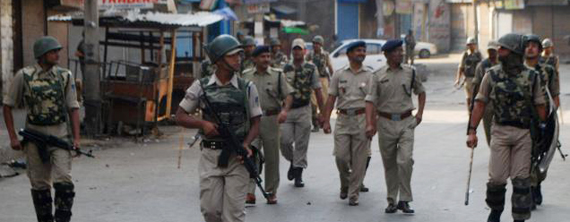
Srinagar, Jul 20: Curfew remained in force for the second day on Saturday in all major towns of Kashmir while rest of the Valley was placed under restrictions to prevent protests against the firing incident in Ramban district that left four persons dead and dozens others injured.
Curfew, which was imposed in the early hours on Friday, remained in force in all areas of Srinagar, Budgam, Ganderbal and Bandipora districts and Shopian, Pulwama, Kulgam, Anantnag, Bijbehara and Sopore towns, official sources said.
Restrictions under section 144 CrPC, which does not permit assembly of four or more persons, have been imposed in rest of the Valley, the sources said.
Curfew was imposed on Friday as a precautionary measure to prevent any law and order problems in view of the separatist calls for protests and march to Lal Chowk.
The restrictions continued on Saturday in view of large scale protests and clashes in many parts of the Valley that left 22 persons including 17 security force personnel injured.
Police and paramilitary CRPF have deployed in large numbers across the city and sensitive towns of the Valley to maintain law and order.
The law enforcing agencies have erected barricades at many places within the city and other trouble spots of the Valley.
Meanwhile, traffic on the Jammu-Srinagar National Highway remained suspended for the third day today due to the tension prevailing across the curfew-bound areas.
A spokesman of the Traffic Department said the vehicular movement on the highway will remain suspended till further orders.





Comments
Add new comment